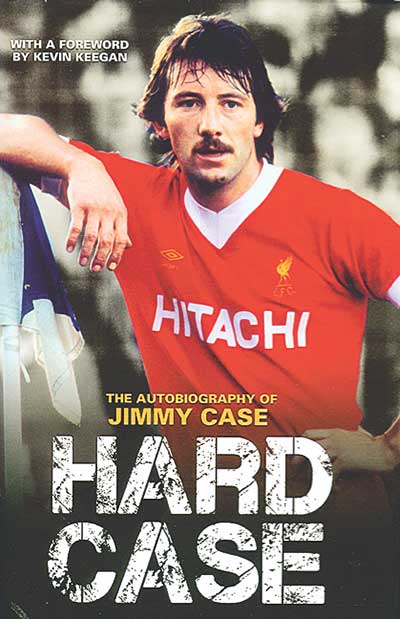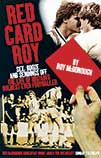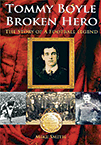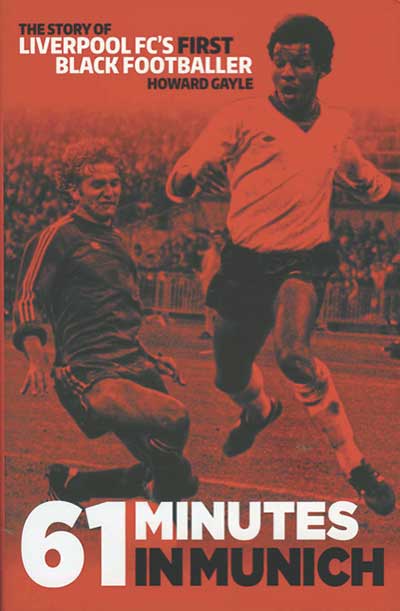Search: 'Tommy Smith'
Stories
 The autobiography of Jimmy Case
The autobiography of Jimmy Case
by Jimmy Case
John Blake, £18.99
Reviewed by Seb Patrick
From WSC 337 March 2015
If things had worked out differently, Hard Case could have been the first footballer’s autobiography to be crowdfunded. Jimmy Case and his ghostwriter Andrew Smart initially sought to get the book printed via online publisher Unbound, a site on which authors solicit advance orders for titles, last year but Case’s memoir didn’t attract enough pledges. Undaunted, they’ve instead managed to find a traditional publisher to take it on – but unfortunately, this change in approach doesn’t seem to have affected the content of the book, which feels badly in need of a stronger editor’s hand.
What becomes immediately apparent from its disjointed, conversational style is that Hard Case is essentially a transcription of Case talking about his career and sharing anecdotes. An opening chapter centred on his Wembley experiences at both Liverpool and Brighton suggests that these thoughts have been grouped together in some kind of thematic order; but from then on it’s a roughly chronological run through his playing career, which nevertheless takes in several diversions forwards or backwards whenever the mood strikes him to refer to something elsewhere.
It’s clear that making itself an accessible read is one of Hard Case’s foremost aims – it’s a welcoming book, from its fairly large print size to its apparent desire to directly replicate the experience of hearing Case reminisce in person. But this style lends itself to repetitiveness very quickly, and by the time you’ve read him guess at having played “thirty-seven games” for the reserves in a particular season only ten pages or so after having already stated that same figure as precise fact, you begin to yearn for Smart to start interfering in the narrative a bit more decisively.
Case himself is difficult not to warm to, especially when telling the Daily Mail’s Jeff Powell directly to his face that he hates him, or responding to a Kenny Sansom taunt about his lack of England caps with the reply “Sorry, I thought you said European Cups”. In his time at Liverpool he was the archetypal example of a hard-working, tough-but-honest 1970s pro and his career is littered with distinctive quirks, from being allowed to continue his apprenticeship as an electrician after signing for Liverpool (essentially becoming a semi-pro player for two years) to being a contemporary of Tommy Smith and Ian Callaghan who was somehow still playing in the Football League as late as 1995.
Yet while there’s much about Case’s career that was unique to him, there are also a good number of his stories – especially on the pitch – that are on the somewhat generic or predictable side. He even manages to squeeze in perhaps one of the most forgettable Bill Shankly stories yet recounted in an autobiography. It’s a shame that so many of these take up space that could have better been spent exploring his life outside football a bit more.
Instead, once the tale of his later years on the south coast is concluded, Case switches to a chapter in which he discusses the present-day Liverpool side’s prospects with an optimism born out of the events of the 2013-14 season. It’s an ill-advised sojourn that has the effect of severely dating Hard Case even before it’s reached shelves; and it’s symptomatic of a book that, for all its good intentions and occasionally lively source material, is sorely in need of knocking into better literary shape.
 Sex, booze and sendings off: The life of Britain’s wildest footballer
Sex, booze and sendings off: The life of Britain’s wildest footballer
by Roy McDonough with Bernie Friend
Vision Sports, £12.99
Reviewed by Tom Lines
From WSC 309 November 2012
The football hard man is still a familiar figure, even if he is receding increasingly quickly into the game’s recent past. Popular culture tends to remember those who played at the highest level, where violent tackles and unsavoury moustaches were brought to a national television audience. For every Graeme Souness or Tommy Smith there were less well-known contemporaries in the the lower leagues. One such player was Roy McDonough, who accumulated a British record 22 early baths.
Apparently assembled from a bin of spare “Soccer’s Hard Men” tropes (the mullet and tache, the drinking and womanising, the failed marriage, the distant father he’s desperate to impress) McDonough is such an unrelenting stereotype that the obligatory career photos have presumably been included to reassure readers that they are not the victims of an elaborate spoof. Driven by limitless quantities of self-belief and an almost psychotic relish for physical confrontation, McDonough played just two first-team games during unhappy spells as a centre-forward at Aston Villa, Birmingham City and Chelsea. At the age of 22 he claims to have made a conscious decision to cruise through lower-league football as a way of funding his fondness for nightclubs.
A man who once promised a horrified physio that he would cut down to “just” 70 pints a week should be heading for a spectacular fall but it is the tragic suicide of Colchester team-mate John Lyons that, briefly, throws the boozing and one-night stands into stark relief. Alcohol permeates almost every page of this book but alcoholism is mentioned only once – when McDonough categorically rejects it as a description of his own drinking.
He is more honest in recounting the football side of his career, with team-mates, opponents, referees, supporters, managers and boardroom “suits” all subjected to withering assessments. There’s also a refreshing lack of dressing room omerta. It’s doubtful that Mark Kinsella will thank him for revealing a teenage fling with his landlady, though McDonough stops short of naming the team-mate who goaded Ian Holloway on the pitch by insulting his cancer-stricken wife.
He’s generous to those he respects too, without ever allowing it to affect his behaviour during a game. He idolises Southend boss Bobby Moore and when the manager gets wind of an unsettled score with Newport County’s Tony Pulis he pleads with McDonough not to let the team down. He is duly sent off after just seven minutes following a self-confessed attempt to decapitate the future Stoke manager.
Ghostwriter Bernie Friend has a great eye for period detail (there has surely never been a more evocatively named central-defensive partnership than Peterborough’s Neil Firm and Trevor Slack) and there are hilarious insights into some of the more eccentric characters of the era: Exeter boss Jim Iley’s fondness for games of hide and seek during training, for instance. In describing McDonough’s nocturnal activities the book occasionally slips into the kind of graphic detail that wouldn’t be out of place on the top shelf of a backstreet 1980s newsagent but this is still a fascinating voyage through a career described as “a violent trawl through the rough seas of the lower divisions”.
 The story of a football legend
The story of a football legend
by Mike Smith
Grosvenor House, £11.99
Reviewed by Alan Tomlinson
From WSC 306 August 2012
Until 2004, when Arsenal’s “Invincibles” went unbeaten through a full Premier League season, Burnley held the record for the longest undefeated run in a single season of England’s top tier. This small-town Lancashire club avoided defeat for 30 successive League games, going on to take their first championship in 1921. At the heart of this achievement was a gritty, combative Yorkshire-born midfield dynamo of Irish Catholic parentage, Tommy Boyle.
Mike Smith’s compellingly related and minutely researched biography of Boyle makes some of Burnley’s championship-winning heroes of 1960 look like pampered softies alongside this tough player, who dominated Burnley’s fortunes either side of the Great War. Boyle was a mere 5ft 7in but dominated the teams he led with a physical and psychological presence that willed his team-mates to victory. He cajoled, bullied and consistently inspired the players at Burnley, and before that at Barnsley, to the highest levels of competitive performance.
Boyle worked as a miner from the ages of 12 to 20, before signing professional terms for Barnsley. He took them to an FA Cup final against Newcastle, before a move to Burnley, who he led to Cup and League success. He was wounded in service in France, called back into action, then resumed the captaincy at Burnley, where eight of the 1914 Cup-winning team reunited for the 1920-21 triumph. For a time, Boyle had it all: the adulation of the “lasses” of the Lancashire mill-town (one of whom he married), money way beyond the reach of working men, the status of the local hero, acceptance and patronage of the local elite.
But the peak of 1921 was achieved in a climate of post-war industrial decline, and as his ageing body became less able to cope with the wear and tear of the top-flight game, his world fell apart. Fiery and brief spells as a trainer at Wrexham and then in Berlin were followed by the collapse of his marriage (after the tragic loss of an only child), unemployment and drink-fuelled aggression and violence. Boyle was committed to the local asylum under the new Mental Health Act of 1930, where he died after almost eight years of incarceration, aged 53.
This is a tragic story told well and with much revealing detail. Smith draws on an impressive range of sources in conveying this connection between the life of a community and the decline of one of its local heroes. The attribution of thoughts and reflections to Boyle is not always convincing, and some parts of the narrative are, as Smith concedes in a disclaimer, based on anecdote and the author’s imagination.
It is a long read, with match reports and lists of names that can jar the narrative flow. But Smith is to be congratulated for bringing alive a figure so typical of the fluctuating fortunes of early professional footballers, for whom the problems of adjustment after the glories of playing days so often proved insurmountable. Boyle’s story is no mere historical curiosity; reading this haunting tale, I was repeatedly reminded of Paul Gascoigne’s life after the magic was gone.
 Gavin Barber enjoyed seeing his son fulfil a childhood dream (for both of them)
Gavin Barber enjoyed seeing his son fulfil a childhood dream (for both of them)
Travelling on the Space Shuttle, appearing on Top of the Pops with my own synth band, playing for Ipswich: these were all ambitions that I had at various points during my childhood. Jimmy Savile heartlessly ignored requests to arrange the first two, and my lack of anything resembling football talent soon ruled out the latter. Which left me with one tantalisingly achievable alternative – to be the Ipswich mascot.
